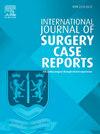Periductal stromal tumor of the breast; Can we expect the diagnosis? A case report and literature review
IF 0.6
Q4 SURGERY
引用次数: 0
Abstract
Introduction and importance
Periductal stromal tumors are rare breast neoplasms characterized by a unique combination of epithelial and mesenchymal tissue. Due to their infrequent occurrence, these tumors are often misdiagnosed as other breast lesions.
Case presentation
A 47-year-old female presented with a right breast swelling. She has a sister treated for breast cancer. Imaging revealed a central lesion of mixed density measuring 38 × 20 mm. The provisional diagnosis was a hamartoma BIRADS 3. The patient underwent wide local excision. Microscopic examination demonstrated biphasic fibroepithelial proliferation. The nodules comprised breast ducts lined by both epithelial and myoepithelial layers; some ducts were patent, while others were compressed into a slit-like configuration. However, the specimen lacked the leaf-like architecture. Immunohistochemical analysis revealed CD34 positivity in stromal cells, while Ki67 was positive in approximately 5 % of cells. The tumor cells were negative for Pan-CK and S-100. These findings led to the diagnosis of a right breast periductal stromal tumor.
Clinical discussion
The clinical presentation of PDST is often misleading. According to the recent pathological classification system, periductal stromal tumors are similar to phyllodes tumors but lack characteristic leaf-like structures. Immunohistochemical studies play a role in supporting the diagnosis. Complete surgical excision of the mass with negative margins is the standard of care.
Conclusion
Periductal stromal tumor is a rare breast neoplasm with potentially benign behavior. Complete excision is the standard management approach, which not only reveals the final diagnosis but may also help reduce the rates of local recurrence and malignant transformation.
乳腺导管周围间质瘤;我们能期待确诊吗?病例报告和文献综述。
导言和重要性:导管周围间质瘤是一种罕见的乳腺肿瘤,其特点是上皮组织和间质组织的独特组合。由于这种肿瘤很少发生,因此常常被误诊为其他乳腺病变:一名 47 岁女性因右侧乳房肿胀就诊。她的姐姐曾接受过乳腺癌治疗。影像学检查发现中央有一个 38 × 20 毫米的混合密度病灶。患者接受了广泛的局部切除术。显微镜检查显示双相纤维上皮增生。结节由上皮层和肌上皮层衬里的乳腺导管组成;一些导管通畅,而另一些则被压成缝隙状。不过,标本缺乏叶状结构。免疫组化分析显示,基质细胞中 CD34 呈阳性,约 5% 的细胞 Ki67 呈阳性。肿瘤细胞的 Pan-CK 和 S-100 阴性。这些结果导致了右侧乳腺导管周围间质瘤的诊断:乳腺导管间质瘤的临床表现常常会引起误解。根据最新的病理分类系统,导管周围间质瘤与蝶形花瘤相似,但缺乏特征性的叶状结构。免疫组化研究在支持诊断方面发挥了作用。彻底手术切除肿块并保留阴性边缘是标准的治疗方法:导管周围间质瘤是一种罕见的乳腺肿瘤,可能是良性的。结论:乳腺导管周围间质瘤是一种罕见的乳腺肿瘤,具有潜在的良性行为,完全切除是标准的治疗方法,这不仅能揭示最终诊断,还有助于降低局部复发率和恶性转化率。
本文章由计算机程序翻译,如有差异,请以英文原文为准。
求助全文
约1分钟内获得全文
求助全文
来源期刊
CiteScore
1.10
自引率
0.00%
发文量
1116
审稿时长
46 days

 求助内容:
求助内容: 应助结果提醒方式:
应助结果提醒方式:


